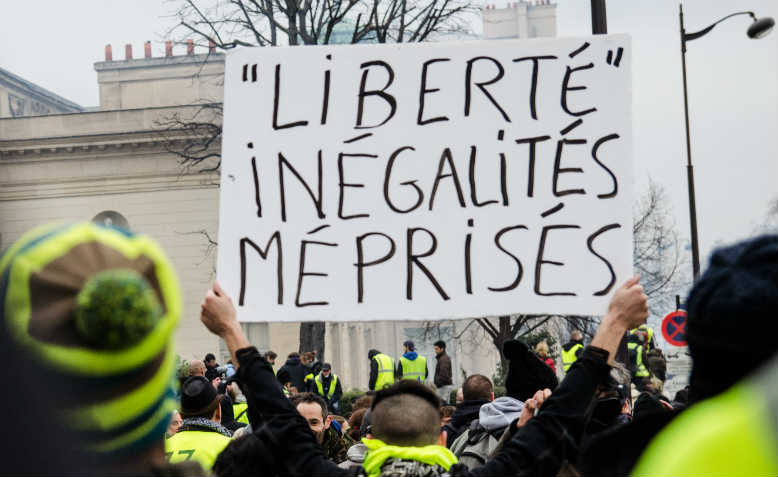 Yellow Vests protest in Paris, 5 Jan 2019. Photo: Wikimedia Commons
Yellow Vests protest in Paris, 5 Jan 2019. Photo: Wikimedia Commons
Repudiating Macron’s ‘great national debate’, Yellow Vests join hands with trade unions and the radical left to build for a general strike, reports Susan Ram
As dauntless as ever after eleven weeks of formidable mobilisation, the movement of the Yellow Jackets (Gilets Jaunes) is poised to enter a new stage of struggle. The past ten days have seen a series of interventions, from within and outside the movement, geared to the launch of nationwide, generalised strike action, potentially on an indefinite basis.
This giant stride forward was initiated by an appeal from the CGT (Confédération Générale du Travail) – France’s foremost trade union confederation of the left – on January 17. This called upon every hard-hit section of French society – workers, civil servants, young people, pensioners and the unemployed – to respond to the national ‘‘social emergency’ by downing tools and taking to the streets on February 5.
The CGT appeal identified core demands, organised into five broad categories:
1An across-the-board increase in income, whether the minimum wage, salaries, pensions, or basic levels of welfare provision.
2A radical overhaul of France’s taxation system in order to effect a giant redistribution of wealth. This to include a shift of emphasis towards progressive direct taxation, with a related reduction in indirect taxes; much higher rates of tax on the super-rich; and a tighter fiscal regime geared to compelling corporate tax dodgers to pay their taxes in France.
3An end to the practice of handing over public money to private sector enterprises (specific schemes are cited), to the detriment of welfare and social protection and with little or no benefit to employment, wage levels, or investment in productive capacity.
4A comprehensive, nationwide development of public services, responsive to people’s needs and employing sufficient numbers to allow public servants to carry out their duties professionally and well.
5Respect for people’s civil liberties, including their right to demonstrate (now under attack by the Macron government).
Dismissing as ‘mesurettes’ (trivial measures) the concessions announced by the government in response to the movement of the Yellow Vests, the CGT statement underlined the need to build ‘un rapport de force’: a counterweight or balance of power in relation to the alliance between government and big capital. Strike action on a massive scale was indispensable to achieving a major redistribution of wealth, the appeal emphasised.
Almost immediately, positive responses began surfacing from the Yellow Vests. Significantly, enthusiasm for a general strike seems to have been building up within the movement’s mass base over several weeks. On the movement’s multiple Facebook pages and other social media sites, debate on how to carry the struggle forward has included growing demands for a national stoppage to intensify pressure on the state. From January 21, a flyer calling for a general strike went viral across Yellow Vest internet pages.
This pressure from the base has built up real momentum. Under its impact, key figures in the Yellow Vests movement, such as Eric Drouet and Maxime Nicolle (aka’Fly Rider’), appear to have shifted ground, moderating their previous hostility to joining forces with the trade unions. On January 22, Eric Drouet launched an appeal for nationwide strike action — also for February 5.
Regional Yellow Vest spokespersons, such as François Boulo in Normandy, have also come out uncompromisingly in favour of open-ended strike action. On January 26, Boulo, a young lawyer from Rouen specialising in labour law, made a direct appeal for an indefinite general strike, again specifying February 5 as the start date. The context was a mass meeting of Yellow Vests in Caën, the second citizens’ assembly to be held in the port city since November.
In Toulouse, too, preparations are underway for generalised strike action beginning February 5, with the CGT call directly referenced in debates. In this major city of south-west France, links between the Yellow Vests and the trade union movement have been active from the start, with CGT contingents (in red safety vests) participating in weekly mobilisations that have often proved the biggest in France (15,000 Yellow Vests and allies were out on the streets of Toulouse on January 25 for Act XI). As in Caën, there is growing pressure for something more than a one-day stoppage; three local-level union organisations have pledged to join forces with the Yellow Vests on February 5 – and continue the action on February 6.
Crucially, the call for a general strike has also won the backing of two major forces of the anti-capitalist political left: La France Insoumise (LFI) and Le Nouveau Parti Anticapitaliste (NPA). Olivier Besancenot, spokesperson and former presidential candidate of the NPA, used a television interview on January 23 to voice support for Drouet’s appeal. Articulating the stance of LFI the same day, Jean-Luc Mélenchon pledged the support of the party’s legislators (in the National Assembly and the European Parliament) for a general strike on February 5; further details of the LFI’s mobilising effort in support of the strike have been promised for January 29.
It is difficult to overstate the significance of this convergence-in-progress. In what must count as his greatest achievement to date, French President Emmanuel Macron has set in motion something of potentially epic significance: a fusion of fury, a melded force of incalculable potency. “Que mai 68 nous serve d’exemple!” reads the line at the bottom of an online Yellow Jacket strike appeal. “Let May ’68 be our example!”

